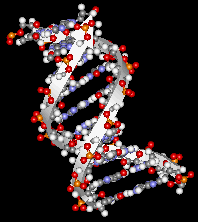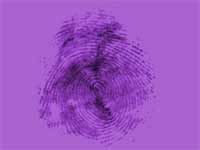We are developing the social individualist meta-context for the future. From the very serious to the extremely frivolous... lets see what is on the mind of the Samizdata people.
Samizdata, derived from Samizdat /n. - a system of clandestine publication of banned literature in the USSR [Russ.,= self-publishing house]
|
Telegraph reports that civil liberties campaigners accused the Government last night of compiling a national DNA database “by stealth” as police prepared to enter the two millionth profile into the system. Police powers to keep DNA samples have been strengthened considerably since 2001 when they were first allowed to keep the information indefinitely from suspects who were not convicted.
The new Criminal Justice Bill now before Parliament extends this rule to people who are arrested but never charged. David Blunkett, the Home Secretary, said the importance of DNA profiling to criminal detection outweighed the civil liberties objections.
The DNA and fingerprint databases have become vital weapons in law enforcement, making our communities safer by helping to put thousands of repeat criminals behind bars.
That would be fine, no one disputes the usefulness of advanced technology in crime detection. The problem is, as Gareth Crossman, a spokesman for Liberty, points out:
The Government is hell-bent on creating a national DNA database by stealth. It claims that only criminals will be listed, yet is passing legislation so DNA samples will be retained indefinitely for anyone who is ever arrested, whether guilty or innocent.
If you have any doubt about the government’s intention – the new Health Secretary, John Reid, plans to ask the genetics watchdog to consider the case for DNA screening of every newborn baby. All in the best possible taste, of course…

BBC reports that Home Secretary David Blunkett is to give details on how two million people are about to be listed on a national DNA crime database. The government originally said in 2000 that it wanted to have three million personal profiles on the system by 2004. This was thought to be the whole of the “criminal class”.
The arguments for such a national database are new figures that suggest it is increasingly obvious DNA evidence can be a potent weapon against all categories of crime. The last three years have seen a 50% increase in the crimes solved using DNA samples.
At the moment, only those charged with an offence have their samples taken, but the government’s Criminal Justice Bill plans to give police powers to take samples from anybody who has been arrested.
Both civil liberties campaigners and some scientists warn that with a potentially vast database, the possibility of somebody being wrongly linked to a crime would grow. DNA evidence is not infallible, with forensic experts evidence referring to the probability of match rather than a definite match.

While it is pointless to even pretend that they are not enjoying every single second of this, we should bear in mind that Messrs.Blunkett & Co at the Home Office did not dream up this ID card malarkey all by their iddle-widdle selves. Let us not forget who is really giving the orders:
EU citizens will have their fingerprints stamped on their passports or undergo an iris scan as from next year, under proposals to be drawn up by the European Commission.
By putting two and two together (generally a rewarding activity) we can see why HMG is so grimly determined to see us all electronically tattooed. They have no choice in the matter. Mind you, the EUnuchs might argue that neither do they:
These measures partly stem due to a US law enacted in 2002, which will start demanding visas from EU citizens from 26 October 2004 if they do not have biometric information (fingerprints, iris scans or DNA) on their passports.
Only ‘partly’, though and it is an argument I would be reluctant to buy. Given the top-down nature of continental societies, I find it very hard to believe that the EU would not have been busily constructing some grand cattle-branding scheme without any prompting from Washington. If, as we are constantly being assured, the Euros were truly determined to establish themselves as ‘the alternative superpower to America’, they would, presumably, tell Uncle Sam to get stuffed.
Most instructive though, if rather disheartening, to actually watch the foundations of a global security state being hammered into place. The technology exists, you see.
Letter to editor (from Blunkett)
Re: Blunkett’s biometrics
Date: 12 May 2003
Sir – I was entertained by Wednesday’s leading article (leader, May 7), which managed to cobble together critical comment about secure passports using biometric technology with laments about state bureaucracy.
Here is a “free country”, “free enterprise” newspaper failing to address the consequences of what free-thinking America is about to do, namely introduce biometric-based entry requirements that will make free entry to that country very difficult for people whose countries do not follow suit.
Everyone in Britain will have to pay around £25 for a compulsory identity card under proposals being put to the cabinet by David Blunkett, the Home Secretary.
The “smart” card will identify the holder using iris-recognition technology. Failure to carry the card will not be an offence but police will be able to order people to present it at a police station.
So, you won’t need to carry the card with you at all time. How is that going to help the ‘fightagainstterrorism’? Ah, the terrorists will just report to a police station to show off their hi-tech faked ID cards…
The charge is aimed at overcoming resistance to the scheme from the Treasury. Until now Cabinet support for a national compulsory identity card has been outweighed by the Treasury, which has objected to footing the estimated £1.6 billion bill.
Notice how the main reason that ID cards have not been introduced is that the Treasury opposed the £1.6 billion bill. Concerns for privacy or individual rights? Blank stares around the Cabinet meeting table…
While forcing people to pay for the card could add to the anticipated objections from human rights campaigners, Mr Blunkett believes that concern about national security is sufficient to ensure that individuals will be prepared to bear the cost.
Damn, the one time Mr Blunkett uses the word individual is to charge him the cost of extending governments reach over the individual.
Senior figures in the Cabinet strongly support the plan for the card, which would use a microchip to hold details including age, place of birth, home address and a personal number to identify the holder. It is also hoped that the card could be used to entitle the holder to a range of state benefits, thereby cutting benefit fraud.
Mr Blunkett discussed his plan for a national ID card with Tom Ridge, the head of the US Department of Homeland Security, at a meeting in Washington earlier this month. Mr Blunkett agreed to develop a joint programme, using the same technology, with the US, which has already agreed a similar protocol with Canada.
US and Canada?! Anglosphere, help!
|
Who Are We? The Samizdata people are a bunch of sinister and heavily armed globalist illuminati who seek to infect the entire world with the values of personal liberty and several property. Amongst our many crimes is a sense of humour and the intermittent use of British spelling.
We are also a varied group made up of social individualists, classical liberals, whigs, libertarians, extropians, futurists, ‘Porcupines’, Karl Popper fetishists, recovering neo-conservatives, crazed Ayn Rand worshipers, over-caffeinated Virginia Postrel devotees, witty Frédéric Bastiat wannabes, cypherpunks, minarchists, kritarchists and wild-eyed anarcho-capitalists from Britain, North America, Australia and Europe.
|





